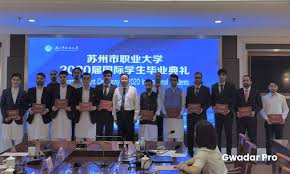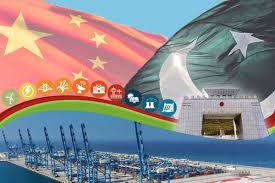Over 30 GB students graduate from education program under CPEC

China Economic Net
Beijing: As many as 37 Pakistani students, a majority of whom from Gilgit-Baltistan have graduated from Suzhou Vocational University after completing three years’ study in China.
Equipped with the latest knowledge and skills in machine manufacturing and mechatronics, they are expected to contribute their due part to the revitalization of “Made in Pakistan” , China Economic Net (CEN) reported here on Thursday.

The students are beneficiaries of an education program initiated and supported by the China-Pakistan Economic Corridor (CPEC) Culture Communication Center, which was jointly established by the government of Gilgit-Baltistan and Suzhou Vocational University three years ago to promote education cooperation and cultural exchanges between Pakistan and China. The scholarship and tuition fee of the 37 students are provided by the center.
The main executor of the program Suzhou Vocational University is located in one of China’s major manufacturing bases Suzhou, from where a considerable amount of “Made in China”products are exported to markets throughout the world. And the achievement is in part attributed to its developed vocational education system.
As per the plan of the program, most of the students learn machine manufacturing and mechatronics at Suzhou Vocational University to meet the demand of Pakistani enterprises for skilled technicians.
Through theoretical and practical courses, all of them have a good command of the know-how to operate sophisticated machines and perform process analysis and CNC programming according to design drawings.
They are also offered internship opportunities at the partner companies of the university for one semester before graduation, and the qualified ones can get a formal offer from the employers.
“With all the skills I’ve learned in Suzhou, I now have the capability to devote to the manufacturing development of Pakistan,” said one of the student representatives who has won the scholarship for three consecutive years.
In terms of their future plan, 20 have received letters of admission from different Chinese universities for undergraduate study, 12 will finish internship and enter into the job market, and the rest have planned further study in Russia, Italy, or other countries.
St. Fulin Group, one of the first Chinese private enterprises to enter into the Pakistani market in 2012, played a major part in launching the program. CEO of St. Fulin Group Li Wenyu said one of the aims of the company is to rejuvenate the manufacturing industry of Pakistan.
Driven by this goal, they had attempted to set up plastic particles factory, printing factory, and building materials industry in the country. However, the shortage of skilled workers due to underdeveloped vocational education in Pakistan undermined the efforts of developing manufacture.
“The elder local experienced workers are devoid of the knowledge and skills to operate the machines imported from China. In this condition, I realize it’s a prerequisite to developing vocational training for young people to rejuvenate Pakistan’s manufacturing industry,” said Li Wenyu.
Li afterward introduced Suzhou Vocational University to the educational department of GB and facilitated the two parties to launch the CPEC Culture Communication Center.
“The center mainly carries the functions of China-Pakistan cultural exchange and vocational education cooperation. We will train technical personnel for Pakistan’s economic development and help build the China-Pakistan Economic Corridor. We will also extend our experience in cultural exchanges and educational achievements to the cooperation with other countries along the Belt and Road route,” Niu Xuelin, party secretary of the University and Cao Yumin, President of the University noted.
The CPEC Cultural Center has held CPEC International seminar, China-Pakistan vocational training seminar, and other conferences alike since its establishment to promote the center’s capacity to provide high-level vocational training for countries along the Belt and Road.





